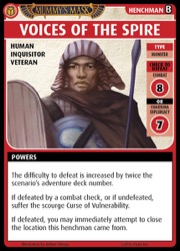| Brother Tyler |
| 1 person marked this as a favorite. |
My group has found the precision aspect of this AP to be a very refreshing addition to the system, something that creates a whole new layer of complexity and tactics for attempting checks. For me, this has been the most interesting new element in the game series.
| Mark Seifter Designer |
Having run afoul of more than a few collapsing scaffoldings (and checking the image twice before posting this just in case), I am fairly sure that the blog has it reversed: you want to roll higher on the second check, which still incentivizes you to do intriguing things like not roll your best skill on the first check (after all, you still will probably hit a 4 with something like 1d8 or even 50% chance with a 1d6 and nothing bad happens if you fail the check other than shuffling the barrier back in, whereas beating both checks and rolling higher on check 1 could be much more painful).
| Frencois |
The whole point is that in many case you can manage to select a skill you don't have in order to roll d4s, thus having a pretty good control on your exact result if you have the required powers/cards to add/remove dice or values after the roll.
But then, just play Ahmotep (Eldritch Scion) with a bunch of gambling items, blessing of Maat and special allies and the true concept of failing a roll goes into Oblivion.
| Frencois |
| 1 person marked this as a favorite. |
Wow... If I read it well anytime a character evades a bane in the Glass Boat, he gets some booze.
Hide that blog immediately! If my friends read that I'm doomed, they gonna empty the box of every drinkable items!!! It's gonna be an Osirion's Hell of a hangover.
My point: Glass Boat doesn't say "When you defeat a bane,..." but "When you encounter a bane,...". So the bounty comes even if you fail to defeat, or not defeat at all.
 Vic Wertz
Chief Technical Officer
Vic Wertz
Chief Technical Officer
|
Sure, but all those banes you're not defeating are going right back into the location deck, while time keeps ticking away.
And check out that scenario text: "When you would win the scenario, you may instead summon and build the location Shrine of the Infinite Void. If you do, you win the scenario only when Shrine of the Infinite Void is closed."
I'm not going to spill on exactly what Shrine of the Infinite Void is yet, or why you would want to give yourself more to do, but I will say that the Shrine will take you longer to get through than most locations, yet Crypt of Water begins with the standard number of locations in play.
Putting this into a Wrath of the Righteous context, this scenario could be called "Temptation of Spirits."
(Also, if you do actually manage to denude the box of Liquids, the scenario reward isn't going to do anything for you...)
| Longshot11 |
| 1 person marked this as a favorite. |
Post-blog, I find the Jet of Anubis and Garden of Ossumentals wording to be quite counter-intuitive and/or misleading. Perhaps due to their first powers ("on your check...add 1 die" and "add 1 die to your check", respectively), I was under the impression that their second powers ("on your check...remove any 1 die" -this being even in the same sentence as the ADD 1 DIE power- and "remove any 1 die from your check") are ALSO played in the Modify Your Check step, and not *AFTER* the dice have been rolled and result has been determined (as implied by the "you haven't lived till you remove the 12 you rolled on your d12"). I would personally never have guessed that is the purpose of the current wording.
I believe if that is the intent, those cards will be better served by a FAQ along the lines of "remove any 1 die from the check's result" - unless I'm really missing a rule that should've made the intended reading obvious.
| Rebel Song |
I believe if that is the intent, those cards will be better served by a FAQ along the lines of "remove any 1 die from the check's result" - unless I'm really missing a rule that should've made the intended reading obvious.
Wow I didn't even notice that! I assumed that all adding and removing of dice happened BEFORE you rolled (like you said) unless stated otherwise (as in Maat: "after a character rolls the dice on any check").
Hmm.
| Longshot11 |
I agree that the text on the cards makes it seem like you have to remove dice before you roll, but when you think about gameplay-wise, that's a super niche ability. Usually if you want less dice you just don't play the cards that add them.
I agree it's niche, but still, as explained in the blog, sometimes I may want to add 2d4 to the check, and then remove the d12 from my base skill. It's certainly one trick to hit narrow targets, and it's a perfectly legit assumption that this is what those cards mean with "remove a die from your check".


































